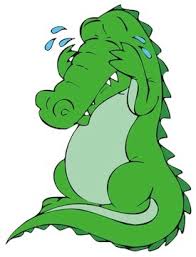
The term crocodile tears refers to feigned or insincere sadness. This term has an etymology dating back several centuries. As early as the fourth century, crocodile tears are referenced in the literature as a metaphor for fake sorrow. Apparently, the fable goes that crocodile’s weep while eating their prey because they are sad; however, this sadness is fake.
The term crocodile tears became widely popular after it was documented in a fifteenth-century book titled, The Voyage and Travel of Sir John Mandeville, Knight. A passage from the book reads: “In that country be a general plenty of crocodiles …These serpents slay men and they eat them weeping.”
As you may already know, crocodilians likely feel bad about little–especially feeding. However, the premise of the crocodile-tears metaphor may be true. In other words, the observation that alligators, crocodiles and other crocodilians cry is apparently true.
In humans, crocodile tears (paradoxical lacrimation) is a medical condition that causes a person to tear up while eating. Crocodile tears typically occur as a complication of Bell’s palsy; Bell’s palsy is a temporary facial paralysis due to damage of the facial nerve. Specifically, when the facial nerve regenerates in the wake of Bell’s palsy, it does so incorrectly thus resulting in tears during mastication. Crocodile tears are treated using a shot of botulinum toxin administered to the lacrimal gland.
Picture Credit : Google

